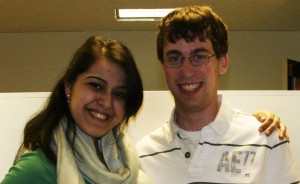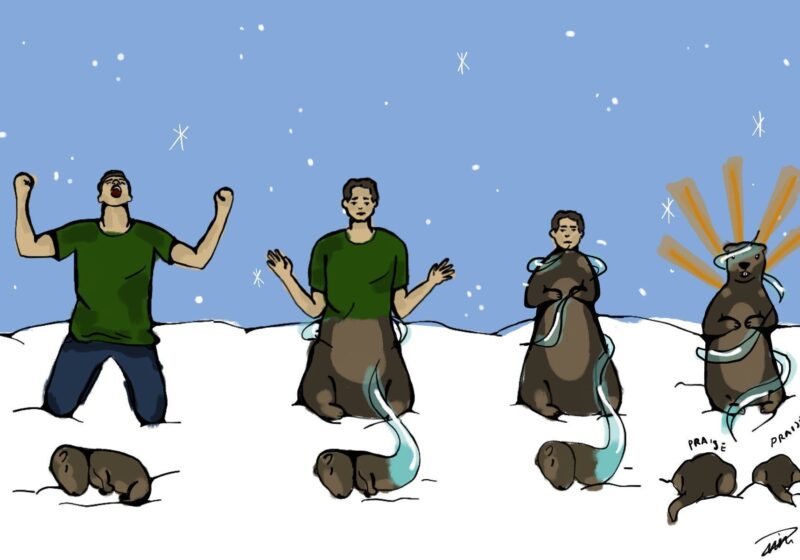
Junior Bradley Halpern and sophomore Rohini Bhatia will take office as the next SA President and Vice President, after winning 973 votes out of the 1,205 votes cast. Courtesy of Drue Sokol, Photo Editor.
The Students’ Assocation’s election results are results are in! — unofficially. They were released on Tuesday, April 6. The elections ran from 10 a.m. on Monday, April 4 until 10:30 p.m. the next day. Junior Bradley Halpern and sophomore Rohini Bhatia won the presidential election, receiving 973 of the 1,025 votes cast while running unopposed. The remaining votes went to various write-in candidates.
“I was worried that students would not feel the need to vote,” Halpern said. “However, I’m satisfied with the confidence expressed by the percentage of votes we received, and I’m honored to serve the UR student body.”
Junior and current SA President Scott Strenger offered the candidates cautious advice upon their election.
“Bradley and Rohini have a difficult year ahead of them with hot-button issues, especially those pertaining to Dining, Facilities and Security,” he said. “Hopefully these issues will not distract them from the core of serving the student and continuing to strengthen our community.”
It’s an unusual occurrence for the SA’s most publicized and important race to be an uncontested one.
As Strenger noted, “An uncontested election is never a good thing, especially in the SA Presidential race. These leaders represent the student body and can best do that by having proved that they are the ones chosen by our community.”
Nonetheless, the nature of this year’s race still presented obstacles to Halpern and Bhatia, the biggest being that they still wished to prove themselves to the student body, even without any competition.
“I was a bit nervous about how students would respond to our platform,” Halpern said. “[It] was broad. I’ve had countless conversations, in greater detail, with concerned students this week, which have affirmed my plans and offered new perspectives.”
In their official platform, Halpern and Bhatia said they had three main goals for their term: “Empowering students,” “enabling access to information” and “developing the campus.” They also admitted that the platform is “broader than most,” but affirmed that this allowed them “the flexibility to best serve [students] in all that comes up throughout the year.” Halpern and Bhatia — both of whom served as SA Senators for two years before entering the presidential race — established a website during their campaign, bradleyandrohini.com, which they intend to use for information updates and open exchanges with students.
Halpern and Bhatia embraced all opportunities for competition during their campaign. “I hate to run in uncontested elections, and was truly saddened to see that I would be doing so,” Halpern said. “So I was totally thrilled to find posters for write-in competition.”
Although several write-in candidates stole some votes from the official candidates, none came close to posing serious threats to the official candidates. Freshmen Adam Ondo and Arthur Dashan — who began a campaign to win the presidential race as write-in candidates only several days before the polls opened — were the most popular write-in candidates, and second-most popular candidates in the race overall, although they only received a total of 59 votes.
Another threat to Halpern and Bhatia’s campaign was the difficulty of simply inspiring students to vote in a presidential election without competition. Sophomore Arturo Spico was one student who admitted to simply writing in some of his friends for the presidential race as “an inside joke of sorts.” He explained, “I took the rest of the voting seriously, but I knew it was a one-man race and it wasn’t really going to change the results, whoever I voted for.”
The unofficial election results show that the fourth-most popular candidates — Take Five Scholars Jonathan Grima and Alex Pozez — received nine votes, meaning that about half of the total write-in candidates only received a handful of votes each.
Other students just didn’t feel motivated to cast their vote.
Senior Diana Miller remarked that, in any uncontested election, “The odds of a write-in accumulating enough votes to pose even the slightest threat is so slim [that] it just seems kind of pointless to vote.” She supported the official candidates, stating that Halpern is “a great guy,” but still remarked, “Unless I have a problem with the people running … what difference does another vote make?”
Still, the winners will be taking office with great enthusiasm from students that showed their support. Sophomore Alanna Scheinerman believed the candidates seemed “very responsible,” and knew of Halpern’s determination in the SA.
“He’s been in the SA forever,” she said. “He’s always involved in cool activites.”
Freshman Brittany Hopkins further praised Halpern, stating, “I know how much he cares about the school and have seen his work in the SA and CAB [where Halpern served in a Chair position]. I have full confidence that he’ll make a great president.”
This year’s elections went on without any problems — an improvement from last year’s elections, in which there were several minor technical errors. Although the SA website currently lists the election results as “Official Election Results,” they have not yet been officially approved by the SA. That status actually means that University IT confirms that elections were completed without any problems. The SA hopes to officially approve the results and make them available by Monday, April 11. For complete results of all SA races, please visit sa.rochester.edu/vote.
Silverstein is a member of
the class of 2013.
Additional reporting by Justin
Fleming, class of 2013.



